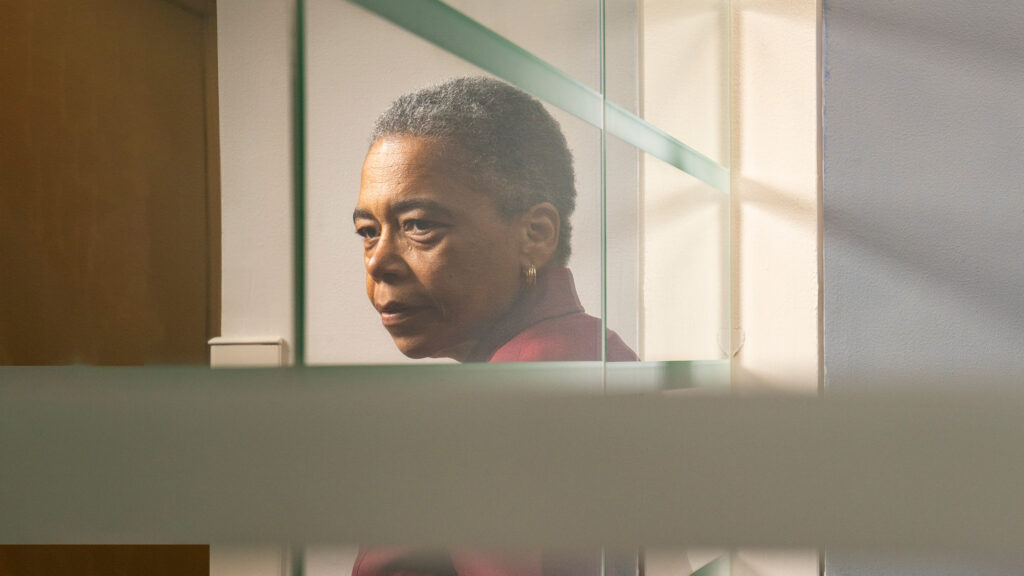Sweeney “will save the world from technology runaway,” says Joan Donovan, research director at the Shorenstein Center and adjunct professor at Tech Lab. “She’s not just teaching ethics and values of technology, she’s teaching students how to build technology that has social meaning beyond monetization.” Donovan, an expert on media manipulation and disinformation campaigns, explains, “I’ve sat in on a few of her classes, and students have been discussing not only the critical perspective, but the true importance of technology design. They have to prototype how to make things work without ignoring inconvenient truths. Technology is both a process and a product, beneficial and harmful, and above all, intentional design can mitigate risk.”
Cathy Pham, a senior fellow at the Shorenstein Center and an affiliate of the Public Interest Technology Lab, also emphasized how uniquely Sweeney is positioned to lead the lab, given her background as a computer scientist and former chief technologist at the Federal Trade Commission. “When I think of Dr. Sweeney, I think of someone who personifies public interest technology,” Pham said. Pham, a computer scientist herself who was appointed deputy chief technology officer at the FTC in 2021, said she is inspired by Sweeney, who has been a pioneer in the field for many years and has “reimagined how technology impacts democracy.” “She’s served in all of these roles. She brings a depth of experience that’s unmatched,” Pham explained.
Sweeney draws on his own deep and diverse background and knowledge to position the lab as a hub for connecting with others working on public interest technology projects. For example, the lab is part of the Public Interest Technology Universities Network, a network of about 50 universities where students and faculty conduct this type of research. The lab also sponsors the Technology Science Research Network, a network of scholars from around the country who study technosociety issues, host events, train students, and publish their research. Scholars from this network contribute to the Journal of Technology Science, of which Sweeney is founding editor-in-chief.
Through the Public Interest Technology Lab, students, staff and faculty have developed a variety of tools and platforms to solve public problems, from increasing voting security to helping people without internet access schedule vaccinations to understanding how major social media companies are shaping the conversation.
Election Credibility Monitoring
One tool Sweeney has been focusing on is VoteFlare. The idea came about in 2016 when students in his “Save the World” class asked how they could empower voters across political lines. Sweeney, along with Harvard doctoral student Jinyan Zang and Data Privacy Lab researcher Ji Su Yoo, found that voter registration information could easily be altered by fraudsters to disrupt elections. In a paper in Technology Science, they published their findings. In 2016, 35 state and Washington DC websites were vulnerable to voter identity theft, allowing fraudsters to change voter registration information. All it takes is a few key pieces of information, most of which are publicly searchable or available through data brokers and dark net markets.
Sweeney and his students thought about how they could solve this problem. The answer they developed was VoteFlare, a tool they liken to a credit check for voting information. People who sign up for the VoteFlare app are notified by a “flare” in the form of a text, phone call, or email if their information is changed online, and can take corrective action if necessary.
VoteFlare was successfully piloted in the Georgia runoff elections in 2020 and will also be used in the 2022 Texas primary. The team plans to deploy it nationwide before the general election, especially in areas at risk of voter suppression. Josh Visnaw, project manager at VoteFlare, explains that the tool “empowers individuals to resolve issues and participate in the democratic process before it’s too late.” He says, “We see this technology as a complement to the good faith efforts of election officials and civil society groups across the country as the 2022 midterm elections approach.”

